This latest iteration of our Insider Interviews Series is with former Amazon Studios Europe Head Georgia Brown, one of the three judges of the third year of Industrial Scripts’ screenwriting contest, The TITAN Awards.
Georgia Brown Biography
Interview with Georgia Brown, former Head of Amazon Studios, Europe
So how did you get started in the business? How early did the bug bite?
“The bug bit early.
But I meet so many people in the industry who always wanted to direct and they would voraciously watch every single movie and memorize the names of the cast and crew. That was never me, I was never that person. I was more curious about the creative industries and the process.
I went to study TV production at Bournemouth University. Then I came out of there and I remember speaking to my tutors going, ‘I don’t want to do any of this, I don’t want to be a camera person, I don’t want to be a sound person. What am I going to do?’
For a moment it put me off my stride because I worried maybe this wasn’t what I wanted to do and what was it in TV that would interest me? I was very lucky that the tutors at Bournemouth were just remarkable. As part of the course, they arranged a placement for me to go to CBBC for six weeks to work on set as a runner. It was when I was there that I discovered the commercial world of television. And that’s what really got me going.
At the time I was working on Top of the Pops and at the end of one of the recordings, I had to take a tape up Wood Lane to BBC Worldwide. BBC Worldwide were the commercial arm of the BBC and discovering what they did really blew my mind. I hadn’t grasped the concept of people watching British television in other countries or the monetization of rights – it was incredible.
This is a whole business built on selling British shows around the world. Something just sparked in me. I don’t know what it was. But it sparked my interest in the commercial world of television.
I spent my six weeks at the BBC basically on the BBC Global Address Book, just looking up anyone who was at BBC Worldwide and emailing them, trying desperately to get a job… which I didn’t!”
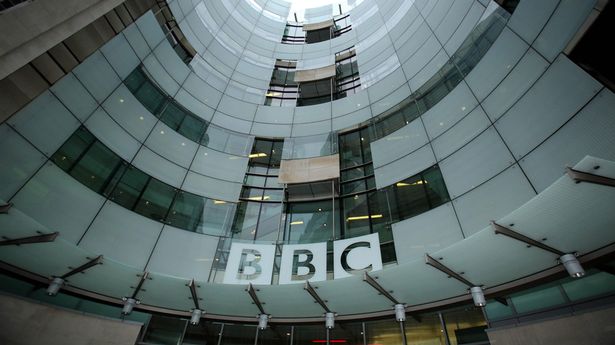
Did you have an natural commercial instinct?
GEORGIA BROWN:
“I was always very commercial. I was always very academic but super creative. And the creativity gave me huge energy and drive. But I was always very academic as a backbone.
So when I discovered the commercial world of television, it ignited a real fascination in me, which has never died. I eventually did get a job working for BBC Worldwide in their sales team for UK and Ireland.”
Was this through the hustle of emailing?
GEORGIA BROWN:
“No, it wasn’t, the emailing got me nowhere!
What it did for me though was give me a real focus and a real energy for what I wanted to do. At this point, I was working in a recruitment company to make some money. But every waking hour was spent emailing my CV off applying for endless runner jobs and disappearing off to London for interviews.
I went for interview after interview after interview. One of the last interviews I went for triggered a very emotional response from me. It was a runner’s role on an entertainment show and the interviewer said: ‘it’s just clear to me you’re not cut out to work in television’.
One of the last interviews I went for triggered a very emotional response from me. It was a runner’s role on an entertainment show and the interviewer said: ‘it’s just clear to me you’re not cut out to work in television’.
Georgia Brown
I remember sitting on that train home and my world crumbled because I thought, ‘what else am I going to do?’
At this point I was really exhausted from travelling to London, applying for endless jobs and getting rejected.
I remember my Dad just sat me down and said, ‘what’s coming will come. Just keep going. You’re fine. Just don’t give up on it. Keep going.’

Within two weeks I had a phone call from a recruitment agent saying, ‘we’ve had this job come up at BBC worldwide. We know you said that is somewhere you wanted to be. It’s in sales, it’s not in the creative element of it. But it’s an in and they’re a big company, you should consider it’.
I went for the interview and at the end there was a test – which I was convinced I hadn’t done well in. So I left the interview and emailed the hiring manager directly saying how much I loved the interview, the company and how much I wanted it. I told her I knew I hadn’t done well in the test but she should give me a shot – and she did.
I couldn’t believe it and I skipped in on day one and that was that – I just really found my place, adored it and navigated through multiple jobs from there onwards.”
How old were you when the person said that (you’re just not cut out) to you?
GEORGIA BROWN:
“I must have been 20. Young.”
That’s a really awful thing to say to someone so young; sweeping and damning and forever.
GEORGIA BROWN:
“I don’t think people realize the impact that kind of feedback has”.
But in reality, it didn’t crush your chutzpah?
GEORGIA BROWN:
“No. Two traits I’ve always had – and they are my superpowers – are that I am unbelievably resilient. I’m an incredibly optimistic, positive person. And I always see negativity as a representation of that person and that moment in their life rather than a reflection of me.
I always see negativity as a representation of that person and that moment in their life rather than a reflection of me.
Georgia Brown
Secondly, I’ve just got a super thick skin. I’m very good at separating out work and me personally – I don’t take this personally, it’s business. Also, I’m very good at contextualizing that this is just TV”.

Do you think we are all quite guilty of mythologizing the industry? After all, we’re not doing the D-Day landings here…
GEORGIA BROWN:
“Yeah, we’re really not. I’m so proud of what we do as an industry. Because TV and film do change lives. It does inform culture and it does so much to society. What we do actually has a huge collective importance.
You do need a thick skin in this industry, and I think you do need to be able to cope with negativity because it’s a constant flow of opinions – positive and negative.
Writers are the people I have the utmost respect for.
To constantly put yourself out there and have everyone have an opinion on your work is tough. You don’t have to be trained in our industry to have an opinion. It’s not like being a lawyer, where to have an opinion or contracts, you’ve probably had to have gone through law school. Anyone can pick up a script, read it and go, ‘that wasn’t very good’.
That’s crushing, if you take it the wrong way. For everyone who says it’s not very good, there are eight hundred who think it’s fantastic. It’s just opinion based on you, your background, your tastes. So it’s a really subjective industry.”
The line between persistence and determination and flogging a project and it breaking through can be agonizingly thin. What’s that moment where you think, “life’s too short, I’ve got to move on from this project because it simply isn’t getting traction“? Would you have any advice for writers? Because no one has got unlimited time right?
GEORGIA BROWN:
“Time is very precious.
No project is unsellable. There might be tweaking that has to happen to sell it, it might not be the project you originally came up with word for word, but every project at its base level is sellable if it’s a good fundamental idea. It’s all about timing.
Going back to when I was out pitching shows, you would go out and pitch and everyone would pass. Then, six months would go by, something topical would come up and you’d try again. You’d tweak it, you’d change it and it would sell.
You must be open to shapeshifting. Lots of writers have such a strong vision, which is super important to bring people on your journey. But it is critical you know your limit – at what point are you prepared to flex your vision or take a note to see this show come to life vs have everyone pass because they want a 30-minute show not a 60, for example? Everyone has a different line they are prepared to walk.
I have spent a lot of time with writers, producers and directors saying, ‘okay, here’s the commercial reality right now and to meet that reality some things need changing’. Some people will, some won’t – there isn’t a right or wrong answer here, it’s not an exact science. But I do think everyone pitching a show should do their research and tailor it to the buyer/audience they are in front of.

A big part of my early career was taking projects out for finance. You can’t take the same pitch into every room and expect everyone to take interest in it. You have to tailor it and really think through who you are pitching to.
Also, surround yourself with people who do know the market. Creator’s visions coming to life often relies on other people – so surround yourself with brilliant minds who understand your vision and have the ability to take it to the next level.
I don’t think there’s ever a point I would give up on a project entirely if I really believed in it. But I would rethink the strategy of taking it out.”
Is the strategic and tactical thinking behind a script almost more important than the quality of the writing?
GEORGIA BROWN:
“I always start with the idea and vision, not the script.
If the creator is willing, all scripts can be edited and can shape-shift along the way depending on so many factors. Great ideas are the foundation of which incredible scripts then bring a vision come to life – there are many more layers on top that can make or break a show – but the foundations have to be stable.
There will always be notes and thoughts that alter that initial draft all the way to the final cut. But fundamentally is the baseline of this an interesting idea and is there an audience for this? It’s rare you just buy a script – you buy a vision.
In my career I have ordered great shows based on scripts that need a lot of work and passed on great scripts that need none…it all comes down to the final audience. As a buyer you are always asking yourself, ‘do I have an audience that needs this?’ You could pitch the best idea in the world, but if I have too many competing shows for that slot in a similar world or I don’t need that audience, I may not buy it even if it is a perfect script.
You need to surround yourself with people who will strategically work with you to think about your path to selling your idea and script and bringing it to life. If that’s not the end game – who are you writing for?”

So writers need to think like producers basically?
GEORGIA BROWN:
“Some of the best writers are showrunners and are very producorial.
Like Jed Mercurio and Steven Moffat, for example. They’re writing to an end game. I don’t know many writers that just want to write and not have an audience see that idea come to life. You want your show to be seen, you want it to be aired – so you need to really think about how you going to get it there.
There’s a lack of training and a lack of understanding, even to this day, around what that process is. It still feels very mythical and the challenge is back to the point of our industry being subjective. Buyers may have a strategy – but essentially every individual has a particular taste and an individual take on material. I will read a script differently to someone else – even if we are following the same strategy.
That’s why it’s great to really do your research or work with people who will do the research for you! If you’re going to pitch to a certain buyer, what are the shows that they bought and loved? What do they look like, what budgets are they, do they like pushing boundaries or playing it safe? I loved Amazon’s obsession with their customer. This is no different – know your customer – in this case – your buyers.”
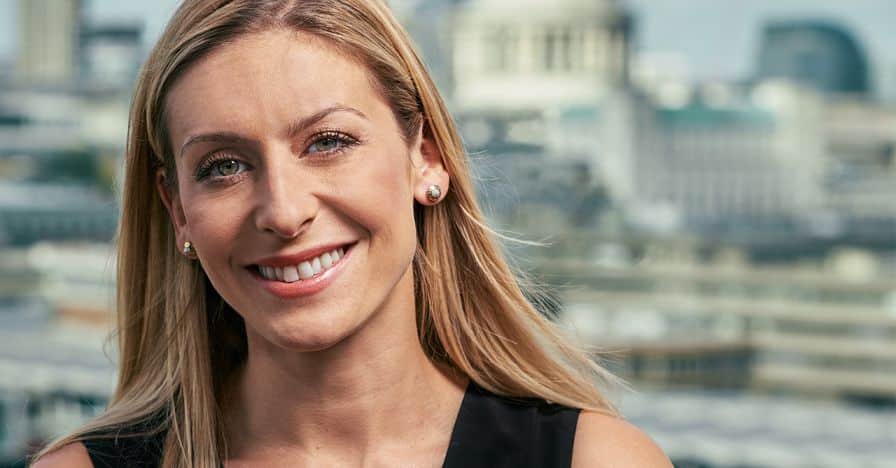
Can give us any insight into that in terms of the stats that will be given to you? What sort of metrics and data do you get in that head honcho position?
GEORGIA BROWN:
“When I started at Amazon, the mythical data didn’t exist. They had only just launched globally and hadn’t made local shows. So the first shows, that you’re seeing now on screen launching, were commissioned purely on great ideas, good gut intuition of knowing an audience, knowing what people wanted internationally, and knowing the whitespace of the other competitors out there. At the time all the streamers were very US based and all focused on scripted. So my first play was to go entirely local and unscripted and it worked.
Then, of course, as you start to launch more, you start to get more feedback from your audience and see what’s missing on the slates to attract and keep customers happy. But ultimately, data is one guiding principle, of many, that go into deciding whether to back an idea. I think that was the reason I absolutely loved my time at Amazon. It was creative first.
No one can predict a hit and they understood that. In the room it always came down to, do we love it? It was very curated and very innovative in the way we were working. We didn’t do a huge amount. So when we were in, we were really in and we had to all just love it and get on board.
So actually for the bulk of my commissioning there, although we had a huge amount of data, the data was just one element. It wasn’t indicative of what we decided to do. The first feel was, do we read this, hear this pitch, read this book, meet this talent and connect? If we connected, and we knew we were passionate and we knew that we could also get that feeling across to an audience – great. That’s the biggest tick.
Then, of course, you go through the process of ‘it’s based on IP, did the IP sell, has it got great marketing hooks, is there casting potential etc?’ But you’ve got to fall in love with something, really. No data tells you that.”

So despite all the data it comes back to fundamentally one person sat in a room saying Yes.
GEORGIA BROWN:
“Storytelling is an emotional response. It is connecting with others, right? I don’t think it’s possible for that to be data-driven. Myself and lots of other people in my position who I’ve spoken to along the way all say the same thing – it all comes down to whether they love that project. Are they passionate about that project? And is there an audience they can service with that project?
That’s the bit that is so hard for people to quantify, lots of the buyers all say the same thing: ‘we want great stand-out content’. So getting under the skin of them, those individuals, becomes super important to anyone wanting to sell a show.”
“We want great stories”, which of course, as you say, is the most maddening thing for writers to hear...
GEORGIA BROWN:
“It’s so infuriating because writers think, ‘I’ve got a great story’ yet it’s not selling.
That again can come down to your network, who’s repping you, and how well-connected you are. Do you actually watch TV and read the trades, are you across who has bought what and what worked or didn’t?
I’m amazed at how many people pitch me ideas we had already commissioned and announced. I think it’s really good to bring your head above the parapet and be in the industry and aware of what’s being sold. And of course – the thing we all long for – luck. Right place, right time.
I encourage people to invest in the industry – read the trades every day, watch the shows people are buzzing about. Pre-Amazon when I had a bit more time I watched the first episode of everything going out. I devoured content. Because it gives you such an incredible sense of the market, the trends, who’s doing what, what’s working, what’s not, the style of certain writers, directors, the producers that can pull off certain budgets and visions etc.”
Let’s backtrack. So how many years in total were you at BBC Worldwide?
GEORGIA BROWN:
“I think it was about six or seven. I was there in what I think of as the golden years. Incredible leadership. Very visionary, very commercial, and really pushing boundaries. At the time I didn’t realize it but now I look back and think I cut my teeth in probably the most commercial and operationally excellent organization in the world.
Everything was done to such a high standard and being trained by people doing it in the most outstanding way has given me incredibly high standards, without knowing it at the time. I know it now because I’ve then gone on to places that weren’t and you suddenly realize the luck of where you’ve been trained.
That’s the other interesting thing about the industry. There’s not a level playing field when it comes to industry training and standards. It’s a lot of on-the-job training and you’re really beholden to the people you work for. It’s why I have always based my career moves on the people running the companies vs the actual jobs. I’ve worked for some outstanding commercial deal-makers and creative talent, who’ve set very high bars for me.”
So you’re at BBC Worldwide for seven years and then you decide to leave. What happened there?
GEORGIA BROWN:
“It was an amazing time. I started in sales and I ended up working my way into acquisitions, and then into the independent unit, which was run by Wayne Garvie and Helen Jackson.
Helen had such an incredible vision. I learned so much in that time. At the time, BBC worldwide were doing some of the first-ever indie investment deals, taking equity in independent producers. That really shook the industry at the time. That was not what distributors did. That was the beginning of what is now very commonplace.”
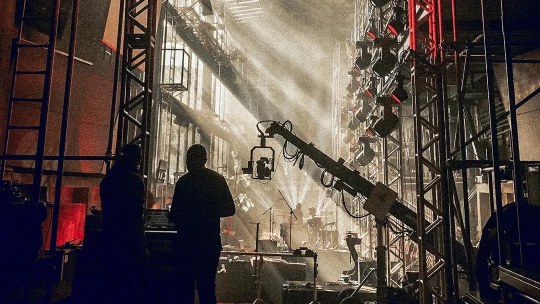
How do those deals work?
GEORGIA BROWN:
“Traditionally a distributor will look under the hood, and if they see a business where there is growth, or they can add value or monetize rights, they’ll take a percentage stake of a company in exchange for investment. There is often a path to ownership but these deals are all variants depending on the producers, the stage they are at, and what they want.
I just loved being in there at that moment with Left Bank, Big Talk, Red, and a host of others, watching them create hit after hit. One of the producers I worked with was Kudos, run by Jane Featherstone at the time. Kudos were working with Liz Murdoch and Alex Mahon, who were setting up Shine. Dan Isaacs, who was the COO at the time, called to say Shine were looking for someone to head up their acquisitions team. He told me about the incredible culture, and how they were operating, and it sounded like a huge opportunity to really be a part of shaping something.
It was hard to leave the BBC but Shine offered such a different approach. It was very boutique and very entrepreneurial, which I loved. In many ways, it set me up for the Amazon job. There was a real start-up mentality at Shine which drove amazing results and meant you had to constantly push and think innovatively in order to beat the arguably bigger competitors.
Whilst I was there, I was able to work with and observe some of the most ground-breaking industry talent – Alex Mahon, Jane Featherstone, Liz Murdoch, Nadine Nohr, Mark Fennessy, Carolyn Bernstein. These people were at the top of their game and unapologetically commercial. Shine is a company that people still talk about today. It was very special.
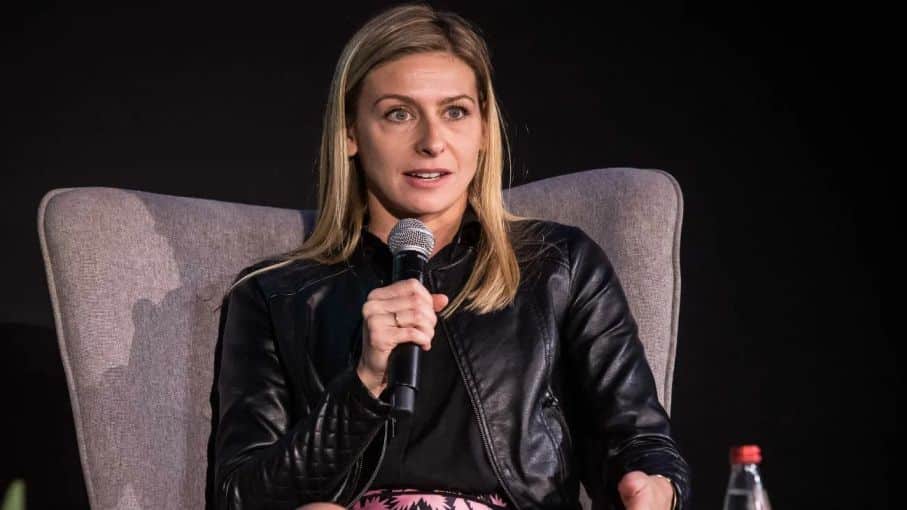
That ignited a huge drive in me. I loved every second. When they were taken over by Endemol, I moved on to Fremantle. They were investing heavily at the time, diversifying their portfolio and were expanding.
That was a really interesting time because it was my first exposure to very high-end European talent like Paolo Sorrentino, Anna and Jeorg Winger, and Ed Berger. I had a brilliant time setting up the team, working with stunning companies like UFA and Wildside, taking their ideas out for international financing, doing deals with buyers like Netflix and HBO, and funding other brilliant indies like Dancing Ledge and Wild Blue.
That’s when I first encountered Amazon. Netflix were booming at that point, they were probably 5-7 years in. They had transitioned from acquiring pure catalogue to original production.”
So in layman’s terms, how does assembling the financing work? Are you looking for an HBO to commission it fully or in part?
GEORGIA BROWN:
“It varies. In Europe, the model is not like in the US. So the commissioning broadcasters are not always the majority funders. They’re putting in substantial money but the budgets in drama are now exponentially higher so you have to find co-producers, pre-buys, tax incentives and MGs.
Over the years, the top-up funding needed has substantially increased, partly due to the broadcaster’s diminishing funds and partly the competition in the market driving prices up. In America, co-producers were quite often coming up with 30% to 70% of the budget.
But as everyone knows, co-producing is hard. So money is only one element. It’s like a marriage, you really need to make sure you are on the same page creatively. Production is tough, especially when making it for two different audiences in different countries!
So it’s a very complex thing to navigate creatively and commercially for everyone involved. But it’s a fascinating thing to have to pull together and can elevate a show in a way it originally wouldn’t have been able to achieve.”
So how did the Amazon job actually come about?
GEORGIA BROWN:
“That was probably the first time in my career that I’ve been quite targeted.
Netflix were around and I was just really interested in the tech space.
When I was at BBC Worldwide, one of my very close friends ran all of the digital side of the business. With Apple and Netflix at the time, I used to love hearing about their plans. It seemed such an obvious place for the business to go and seemed super fresh and super distinctive in terms of how they were thinking about content. So I had long admired this new wave of buyers.
I was at NATPE in Miami and Morgan Wandell was there, who at the time was one of the creative chiefs for Amazon in LA. I remember meeting him and I think it was the first time I’ve really been that bold and just said, ‘I want to come work for you. I’d love to work for Amazon. This is so interesting’. He was really visionary and had backed some great ideas at the time.
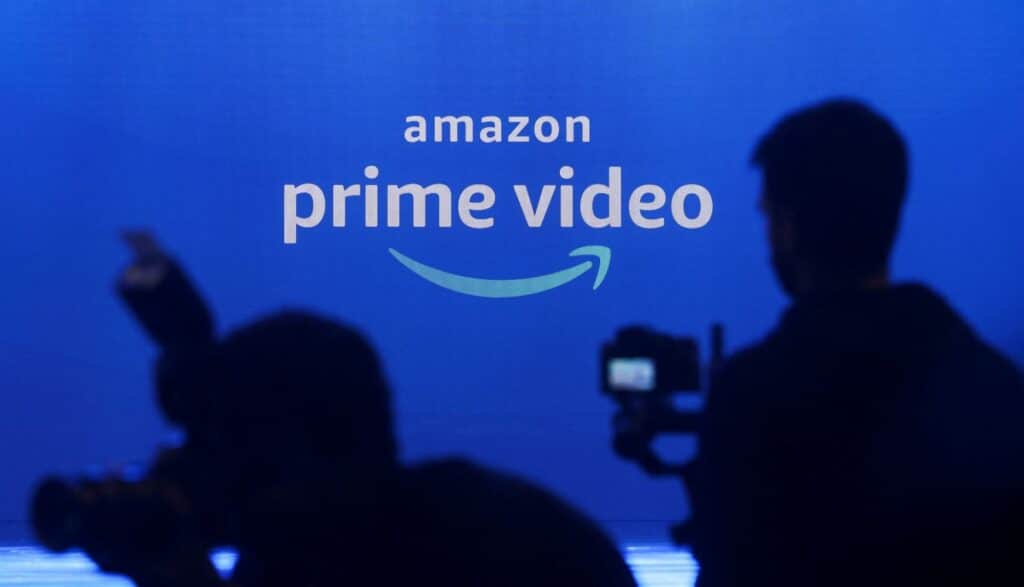
That was the beginning of probably a year and a half long conversation. We just kept talking and then I had a phone call saying, ‘okay, we are going to make this role, it will be a head of Europe role but it’ll be in London and this is the process’.
Then it all happened very quickly. Amazon interviews in a unique way. You have a couple of phone screens. Then you must go to something called ‘the loop’, which is quite infamous. I think had eight interviews back to back with various different executives, not just in the studios but from different bits of the business.”
Were they meeting a lot of people?
GEORGIA BROWN:
“I’m sure they must have met lots of people, but it’s a very particular company to recruit into and I was very up for the challenge.
I think I was quite uniquely placed. Again, it’s these lucky things that you don’t think about at the time in your career. I’d never specialized in one genre, I’d always been scripted and unscripted.
I’d never been territory specific either. And our industry is very much set up under territory; you’re a UK lead, for instance. But I just always found myself global. Because I was very interested culturally by other ways of storytelling and other ways of conveying stories. I was always in companies where we were very driven to look outside of the UK for content.
I was probably one of the very few executives in the industry, at a certain point in my career, who had managed multiple genres and multiple territories. So to go and be the head of Europe and set up a multi-genre studio; there just aren’t a lot of people who’ve got the experience.
I remember getting the phone call from them saying, ‘right, you’ve got it, it’s yours. Here’s the offer’. I was totally shocked!”
It’s an incredibly visible and public role, isn’t it? It also must have felt like a massive leap up?
GEORGIA BROWN:
“A huge leap. I’d never commissioned a show or movie before. Fundamentally though, I was in a very good position. Having worked with multiple producers, directors, and creatives across multiple languages in multiple regions, and being strong creatively and commercially made me stand out.
I walked in on day one alone and ended up building studios across 7 territories in my 5 years. I am immensely proud of everything I and the team achieved.”
Georgia Brown
I think people forget; my job was to set up a studio from scratch. It wasn’t purely creative. There was a lot of infrastructure to build before I could even think about commissioning. I walked in on day one alone and ended up building studios across 7 territories in my 5 years. I am immensely proud of everything I and the team achieved.”
What was that like? Knowing it’s one of the biggest gigs in the game. Were you daunted? Nervous?
GEORGIA BROWN:
“Daunted at times. I accepted the job and still at that point thought that it could go wrong. Because they weren’t established. It’s so easy now to go ‘It’s Amazon!’ But they were a tech company. They had made a few things in LA. But they weren’t anywhere near at the scale of the other buyers and there wasn’t a blueprint for setting up a European streamer at the time. I think I was one of the first to tackle it!
So it was a bit like, ‘this could go disastrously wrong’. The UK is a thriving market. Europe, in itself, is a thriving market. It doesn’t necessarily need this alternative model to keep creating, So I was really overwhelmed by that prospect. Even when I accepted it, I thought that this could be the last thing I do. However, I also thought that if it was, what way to go out, what a fun thing to do, right?”
What about the cultural part of it? Was there a part of you thinking, “this is gonna nuke my life”?
GEORGIA BROWN:
“Oh no. I think the commercial world of television is very different. I was working very intensely in all of my previous jobs. Partly because I loved it and it was a pleasure to do. I crave fast-paced, I crave juggling a thousand plates. It comes back to that resilience. I’m very, very good in that high pressured environment.
I knew culturally, I’d fit in very well there. Just because of the way I operate, the way I work. I’m very strategic. I’m super logical. And I know how to pick local hits that will travel the world.
My whole career had been converting the creative language to commercial and commercial back to creative. I could turn my creative face on, I could sit in an edit or a writer’s room. Then I can turn around and be sat in a big board meeting, getting millions of pounds signed off. I knew how to navigate that.”
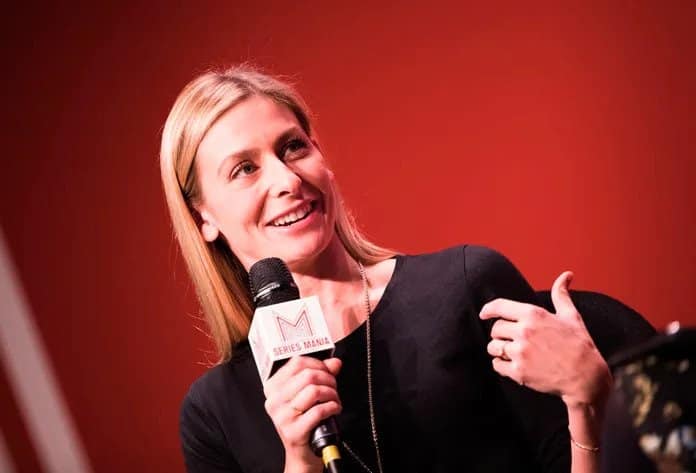
Were you self-aware enough to sell that specific point of difference – that commercial and creative head – during the interview process?
GEORGIA BROWN:
“Probably not. I remember a couple of years ago, the point where I suddenly realized that was valuable and not a negative. I’d spent a lot of my early career trying to validate my odd mix of skills. I remember talking to head hunters in the past who just didn’t get it, was I creative or commercial – which box did I belong in?
At points, I felt I never belonged in either camp and I had huge imposter syndrome. I felt very apologetic depending on who I was with. And then the penny dropped – it is a huge point of difference, and a really unique skill to have.
With Amazon, I really found my stride because it was this skill set that stood me apart and allowed me to go in as a team of one and build the infrastructure and team out, as well as lead the creative vision, ordering globally successful, award-winning shows and doing deals with some of Europe’s best talent. I was never worried or daunted by the prospect of working hard.
I accepted the job. Then two weeks later, I found out I was pregnant. My boss at the time was amazing and supported me in that journey. So I started the Amazon job at 38 weeks pregnant, and never looked back.”
Where did you work?
GEORGIA BROWN:
“I was going into the Amazon corporate offices, which at the time was in High Holborn, and then it moved over to Shoreditch later.
I didn’t even have a desk when I started. It’s so hard to comprehend now but it really was the ultimate startup. Fundamentally that is Amazon. I love that entrepreneurial culture, I thrive very well in that environment.
In the early years, we traveled a lot. I always wanted to be in the room with the talent vs on a call. You got such a stronger sense of the market by being there. So I think I was out of the country more than I was in it, airports became my office.”
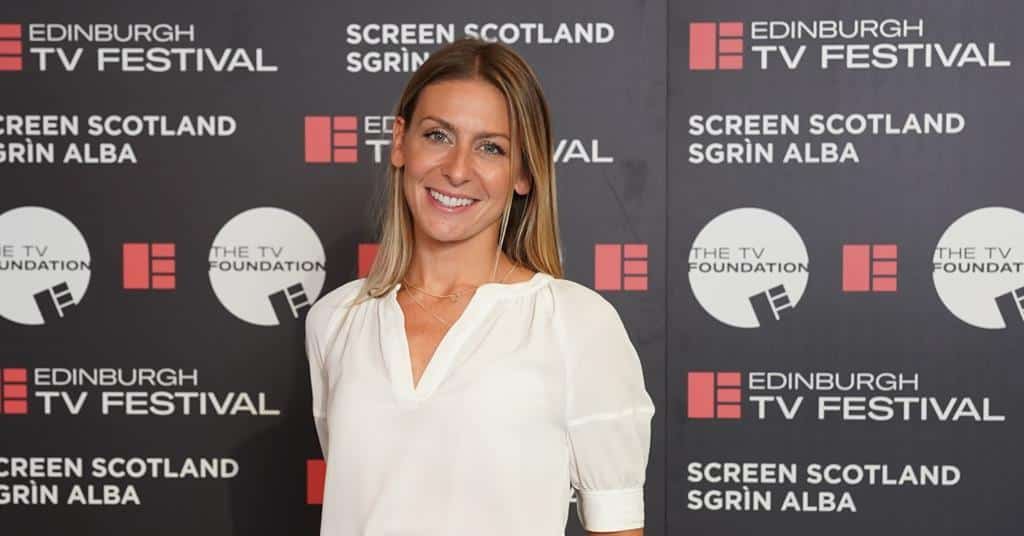
How many emails were you getting on a bad day?
GEORGIA BROWN:
“That was one of the biggest adjustments. The news leaked in the February and I didn’t start until the July. The moment producers in the industry heard the news, the emails started.
I wasn’t even in the job for another four or five months but in that time alone I had been sent hundreds and hundreds of pitches, scripts and emails. That was quite challenging.
I would get around 500 emails a day and a huge bulk of those needed responding to.
I talk a lot about it when I do mentoring and talk to creatives. It’s important you think about what you are putting in an email and how you interact. I had always been the person who would do a lot of favors, read a lot of people’s work, and give a lot of advice.
That accessibility was important to me and continued to be at Amazon. But it really helps when people are directional in their communication. I.e. if you are attaching a script what territory is it for, what genre, how many eps, what’s the timing, who is attached etc?”
You’re a very warm, personable kind of individual, which has obviously been a super-strength. But did you have to pull the drawbridge up and the portcullis down somewhat?
GEORGIA BROWN:
“I probably should have and I never really did. I gave a lot of myself away but I became really targeted in what I wanted by saying to people, ‘I’m looking for x y z. So if you’re not sending me that, I am unlikely to read it straight away’.
I was always thinking about how you remain truly open to finding those really unique, quite distinctive shows that aren’t written by voices audiences have heard before. It’s by giving new people breaks, that’s how shows like The Devil’s Hour and The Rig came about.”
That is a great insight into the sheer intensity of it…
GEORGIA BROWN:
“It was intense. But I leant into the challenges by being transparent. I would go on all my panels and I would put up a chart of my team and our contact details, as well as tell people the roles I was hiring for. I would have my team on and I’d say, ‘this just to be clear is the entire European studio and it’s three people.’
So it gave people context as to why it may take us a bit more time as well as a clear view of who to talk to – which can often be challenging in the buyers’ world.
We tried to be really transparent. That was my way. But even in the hardest moments, I always used to come home and think ‘I’m lucky. What a privileged job this is’. I’m an eternal optimist and we had a lot of fun.”
Did you find your Rolodex just went through the roof?
GEORGIA BROWN:
“I am very fortunate and have a wonderful industry network.
But again, I come back to the fact that I wasn’t just the creative leader, I was the architect, building it operationally as well as creatively. So my network isn’t what you would expect, it’s very diverse, and it’s not just talent. It’s what I loved about the job.”
What are you most proud of during your time at Amazon?
GEORGIA BROWN:
“All of it. Setting up seven production hubs across Europe, investing into training and sustainability to really future-proof the industry, producing some best-in-class, outstanding award-winning content, hiring some amazing people, offering an alternative home to people who wouldn’t have found their shows made anywhere else and being part of such a wonderful team.
Amazon hired me because I came from a non-traditional route, and I passed that baton on down. I hired a lot of people who’d never commissioned shows, who’d never come from that world because they offered the most incredible alternative creative perspective. They were very hands-on and producorial, which really helped the projects and it meant you could take a bet on more inexperienced people because the team around them was strong. I’m so proud of the team, what they have achieved and will go on to.”
As a very strongly commercial person, do you have a view on the debate of Marvel and the streamers’ effect on the art form?
GEORGIA BROWN:
“There are more buyers right now than ever before, there are more people wanting content in multiple forms than ever before, there are more brilliant ideas than ever before. Every single creative and studio needs to own their narrative and create in the form that they think is going to be the best version for the audience they are making it for.
Obviously, cinema has been hugely impacted by COVID, undoubtedly. Streamers are now moving into movies in a significant way. The world is evolving – and that presents opportunity.
Everything has to evolve. I think you either embrace that or you’re left behind. All this evolution has afforded us the most amazing advances in creative technology.
So I embrace all movements in the industry and all changes in technology. I think there’s a place and a moment for everything in any form.”
What does the future hold for you?
GEORGIA BROWN:
“I want to continue to make an impact, continue discovering and nurturing that next generation of talent and working hard to future-proof the industry. It’s going to be an exciting year!”
And final question, how excited are you to be part of the TITAN 2023?
GEORGIA BROWN:
“I am SO excited. Talent discovery platforms like The TITAN are critical. They’re absolutely critical.
I have always put a huge amount of time and effort into setting up different writer’s academies and schemes and backing talent. Because any avenue where you can increase people’s path to entry and an opportunity for seasoned execs to get looking at relatively undiscovered talent are critical. Things like this are the lifeblood of the industry.
So I feel hugely privileged, first of all, to be part of it. There will be writers in here that maybe wouldn’t have had the opportunity before or wouldn’t have had eyes on them. They’re going to get discovered and we will probably be sat here discussing their BAFTA win in five years. That, for me, is hugely exciting. It’s what we’re here for.”
Thanks Georgia!
Georgia Brown was speaking as a judge of the third TITAN Screenwriting Contest, by Industrial Scripts. Read more about the contest and enter at the link below.
- Enter the 2023 TITAN Screenwriting Contest.
- View all previous Insider Interviews, here.
- What did you think of this article? Share It, Like It, give it a rating, and let us know your thoughts in the comments box further down…
- Struggling with a script or book? Story analysis is what we do, all day, every day… check out our range of script coverage services for writers & filmmakers.
Get *ALL* our FREE Resources
Tackle the trickiest areas of screenwriting with our exclusive eBooks. Get all our FREE resources when you join 60,000 filmmakers on our mailing list!

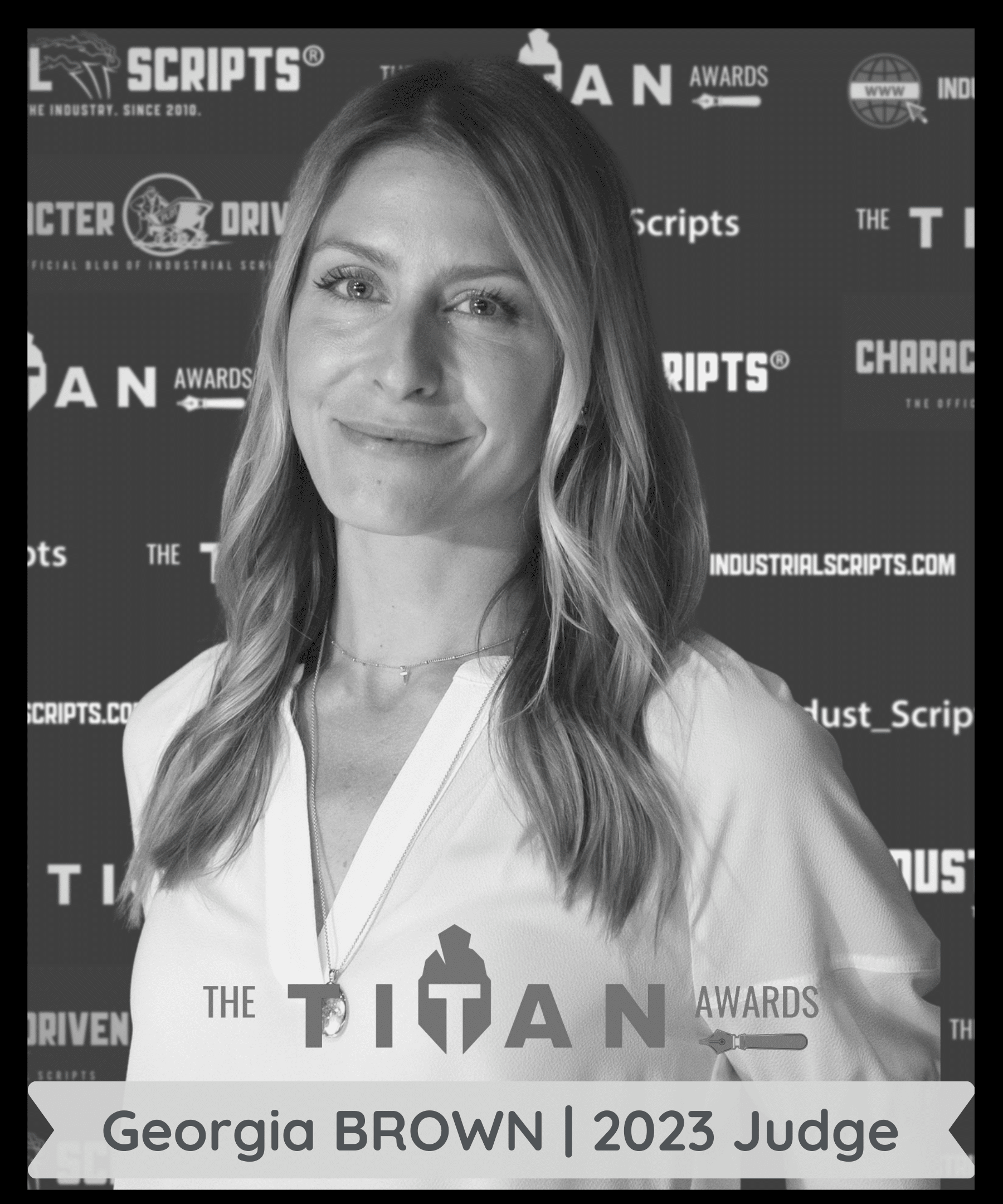
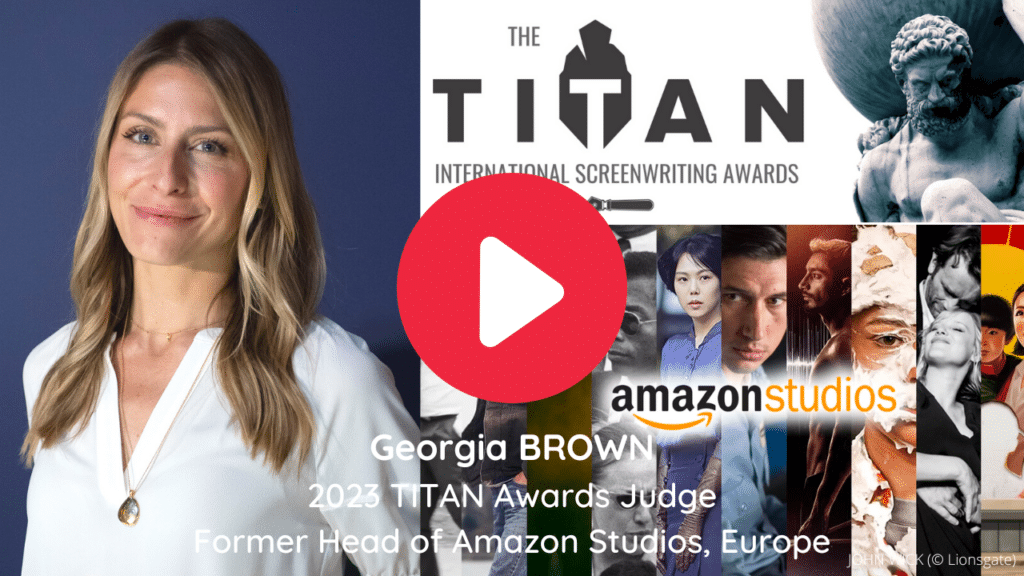
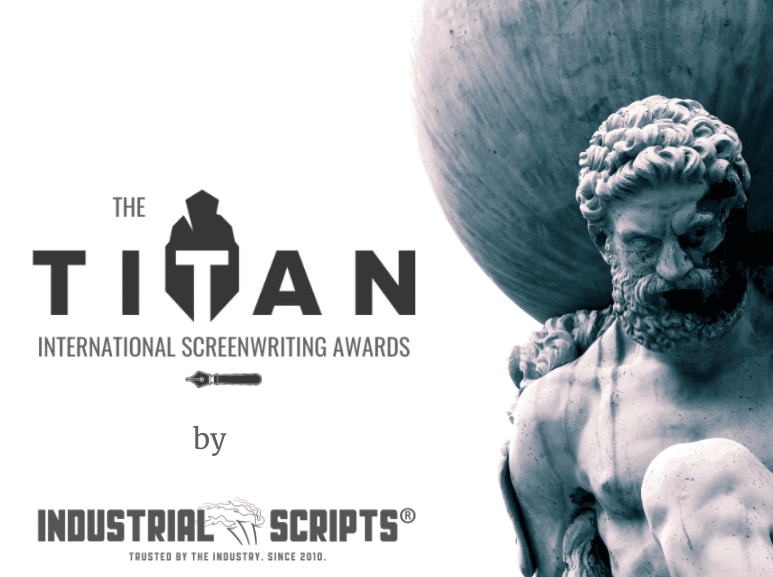
Any job that you give me I can work but help me to be there
Also I am fast learner
Georgia-
Thank you so much for your warm, thoughtful, and incisive interview.
Your honesty and your values come across loud and clear.
I’m writing to you because I cannot find a clear, comprehensive answer to a very simple and important question or two about the Titan Awards. I trust that you too have asked these very same questions yourself, prior to your signing on to judge the contest.
How many screenplays that have done well in the Titan Awards have ever actually sold? How many Titan Award contestants have had their scripts successfully produced?
Given the number of winners in the past, approximately what percentage of those outstanding and award winning scripts have then afterwards made it through the maze, been sold, and have then been made into successful film and television shows?
And of those scripts, however few or many, that have truly scaled the castle wall, do you have any personal favorites that have led you to want to lay your name on the line in your decision to judge this contest?
You’re busy, I know, and time is always short for all of us: but the nature of your interview, and the crystal clear impression you leave in this interview as to your character and your core values have given me the faith and the courage to write to you personally.
My hope is that I’ve not been rude in doing so.
Thank you so much again for your thoughtful interview, and for your valuable time.
Sincerely,
Bruce Van Noy
Orcas Island, Washington
and Ketchum, Idaho.